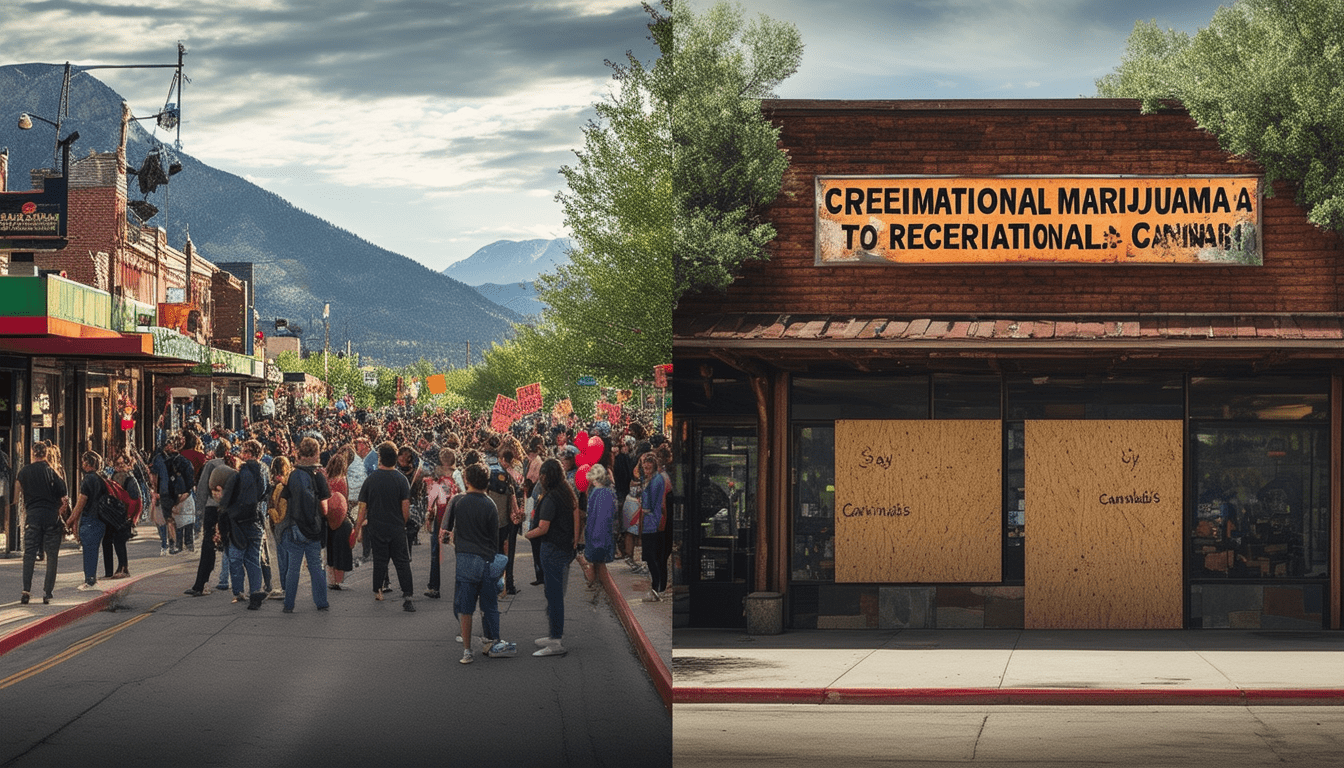Colorado Springs Electorate Passes Conflicting Marijuana Ballot Initiatives: One Legalizes and the Other Bans Recreational Sales
|
IN BRIEF
|
The recent decisions made by the Colorado Springs electorate illustrate a profound legal paradox. Voters approved two contradictory ballot initiatives concerning recreational marijuana sales in the city. One measure, designated as Ballot Issue 2D, aims to enact a ban on retail marijuana, while the other, Ballot Question 300, permits existing medical marijuana establishments to sell recreationally. This divergence raises significant questions about how city officials will interpret and implement these conflicting regulations, leaving constituents and stakeholders in a state of uncertainty.

Overview of the Situation
The recent elections in Colorado Springs have led to a significant legal conundrum as voters approved two opposing ballot initiatives regarding marijuana sales. One measure seeks to ban all retail marijuana sales in the city, while another permits existing medical marijuana dispensaries to sell recreational cannabis. This scenario creates a complicated legal framework that city officials must navigate, reflecting the broader challenges in implementing cannabis policy amid conflicting local regulations.
The Conflict Between Two Ballot Measures
Colorado Springs voters found themselves faced with two ballot measures that addressed the issue of cannabis from drastically different viewpoints. On one hand, Ballot Issue 2D was approved by approximately 53 percent of voters. This measure amends the city charter to prohibit all retail marijuana sales within the city limits. Conversely, Ballot Question 300, which received a similar level of support, allows the city’s roughly 90 medical marijuana dispensaries to apply for a recreational sales license. This dual approval raises questions about how the city can reconcile these conflicting laws.
Legal Implications for Colorado Springs
The mayor of Colorado Springs, Yemi Mobolade, commented on this unique situation by stating that the outcome creates “a really interesting legal dilemma.” As city spokesperson Max D’Onofrio noted, the city is tasked with interpreting and implementing these measures in a way that aligns with the city’s charter. Given that the city charter holds precedence over ordinances, conflicting provisions from Ballot Question 300 cannot be enforced if they oppose the charter amendments of Ballot Issue 2D. This legal framework suggests that recreational marijuana sales are likely to remain illegal in Colorado Springs.
Public Sentiment and Future Considerations
Advocates of Ballot Issue 2D are optimistic about the implications of their victory, arguing that it signifies a mandate for stringent regulation against recreational marijuana sales. Citizens for Responsible Marijuana Regulation expressed confidence that the intent of voters will lead city officials to uphold the ban. Meanwhile, supporters of the alternative initiative are eager to collaborate with municipal authorities to devise a regulatory framework for recreational cannabis sales, should the legal contradictions be resolved.
Contextual Background
The recent ballot initiatives are not the first attempts to regulate marijuana in Colorado Springs. In a previous election held in 2022, voters rejected an ordinance that would have permitted recreational marijuana sales. This pattern highlights an evolving public sentiment towards cannabis regulation in the city, influenced by various socio-economic factors and changing perceptions of marijuana use.
Looking Ahead
The city council of Colorado Springs is set to meet on November 12 to discuss the outcomes of the recent election, including the complex interplay between the approved measures. In the meantime, the debate around recreational marijuana continues to unfold, exacerbated by newly enacted zoning regulations that restrict sales near sensitive locations like schools and treatment centers. The city’s efforts in navigating this legal maze will serve as critical insights for future cannabis legislation both locally and in other jurisdictions across the nation.
As this situation develops, residents and officials alike will be closely monitoring the implications of these ballot measures. Various cannabis advocacy groups and stakeholders will likely continue pushing for clarification and action, ensuring that public interests are considered as the legal framework surrounding marijuana sales is established.
For ongoing updates on marijuana legislative measures, refer to Nebraska marijuana ballot measure validity, and insights from Florida legalization initiatives that reflect broader trends. For real-time updates, check real-time ballot outcomes and consider the implications of local elections on state policies, as highlighted by claims of strong public endorsement of Kentucky Governor’s recent wins and the ongoing challenges against the DEA regarding marijuana rescheduling here.
Comparison of Colorado Springs Marijuana Ballot Measures
| Measure | Impact |
| Ballot Issue 2D | Bans retail marijuana sales in the city |
| Ballot Question 300 | Allows medical marijuana stores to sell recreational marijuana |
| Vote Support for 2D | 53% approval among voters |
| Vote Support for 300 | Also approximately 53% approval |
| Legal Precedence | City charter supersedes ordinances, affecting implementation |
| Potential Outcome | Recreational sales likely remain illegal due to conflicts |
| City Council Review Date | Next meeting scheduled for November 12 |
| Stakeholder Reactions | Proponents for 2D optimistic about enforcement |

Conflicting Marijuana Initiatives Emerge in Colorado Springs
The recent elections in Colorado Springs have led to a surprising and complex legal situation as voters approved two conflicting marijuana ballot initiatives. One initiative aims to ban recreational marijuana sales within the city limits, while the other allows existing medical marijuana stores to sell recreational cannabis. This dilemma has raised questions about the implications for the city’s cannabis industry and legislative framework.
Understanding the Ballot Measures
During this week’s election, Colorado Springs voters supported two competing measures: Ballot Issue 2D and Ballot Question 300. About 53 percent of voters approved Ballot Issue 2D, which amends the city charter to prohibit recreational marijuana sales. Conversely, a similar percentage backed Ballot Question 300, which permits existing medical marijuana dispensaries to seek licenses for recreational sales. The overlap in voter support for these opposing measures has created a complex legal landscape that necessitates careful interpretation.
The Mayor’s Stance on the Legal Dilemma
Mayor Yemi Mobolade has described the outcome as a “really interesting legal dilemma,” acknowledging that both measures, if certified, would require careful reading and implementation to ensure consistency. City spokesperson Max D’Onofrio has indicated that the charter amendments (Ballot Question 2D) take precedence over ordinances (Ballot Question 300), hinting that the ban on recreational sales may ultimately prevail.
Implications for the Cannabis Industry
The passage of these contradictory measures poses significant implications for the cannabis industry and local governance. While supporters of Ballot Question 300 express optimism that city leaders will honor voters’ intent to legalize recreational marijuana, those backing Ballot Issue 2D reiterate the need for responsible regulation. The current situation reflects ongoing tensions in marijuana legislation, which are not unique to Colorado Springs but resonate across various jurisdictions.
What Happens Next?
The city is in the process of reviewing the ballot language and determining the implications of the recent votes. City Council will reconvene on November 12 to address the legal and regulatory challenges stemming from these outcomes. This meeting will be critical in setting the course for the future of marijuana legislation in Colorado Springs, as the city navigates the dual mandates from its voters.
Looking Ahead: A Broader Context
This intriguing situation in Colorado Springs isn’t isolated. It mirrors larger trends in cannabis legislation across the country, highlighting the complexities of regulatory frameworks. For instance, recent developments in states like Texas and Kentucky showcase shifting public attitudes and the push for both medicinal and recreational reforms. The importance of understanding local context is critical for both policymakers and the electorate when addressing marijuana issues. For more insights on the potential benefits of medicinal cannabis, consider exploring articles on unlocking healing potentials and recent referendum wins. Additionally, keeping an eye on how national political climates—such as the implications of presidential elections—affect local cannabis regulations can provide deeper insights.
- Conflicting Measures: Voters approved both Ballot Issue 2D (ban) and Ballot Question 300 (legalization).
- Election Results: Approximately 53% support for both initiatives.
- Legal Dilemma: Mayor identifies a “legal dilemma” stemming from the dual approvals.
- Implementation Challenge: City charter takes precedence; Question 300 may not be enforceable.
- Expectations: Advocates of Ballot Issue 2D predict a successful ban implementation.
- Regulation Hopes: Supporters of Ballot Question 300 aim for a responsible regulatory framework.
Overview of the Situation
The recent voting in Colorado Springs has led to the approval of two conflicting marijuana ballot initiatives. One measure, Ballot Issue 2D, proposes to ban retail marijuana sales within the city limits, while the other, Ballot Question 300, allows existing medical marijuana shops to apply for licenses to sell recreational marijuana. This situation has created a significant legal dilemma for the city, as the city charter is positioned to take precedence over any urban ordinance, making it essential to analyze the implications and potential pathways forward.
Understanding the Legal Implications
The approval of conflicting measures has raised several legal questions for city officials. Given that the city charter (as amended by Ballot Issue 2D) takes precedence, city officials must interpret how this can coexist with the provisions in Ballot Question 300. A fundamental recommendation is for city officials to conduct a thorough review of both measures to ascertain how they can be applied without violating the intent of the voters.
Implementing even parts of the approved measures may lead to further legal disputes unless clear adherence to both sides is established. It would be prudent for the city to seek expert legal counsel to navigate the complexities of conflict resolution between city charter laws and urban ordinances in this matter.
Engaging with Voters and Stakeholders
To foster a productive environment, city officials should actively engage with the community and stakeholders. This can be accomplished through town hall meetings or forums where citizens can express their views and concerns regarding the measures. By inviting open opinions, city officials can better understand the community’s perspectives and work towards crafting regulations that align with their constituents’ desires.
Moreover, an outreach program aimed at those who supported both measures might unveil possibilities for collaboration. Engaging both supporters of proactive marijuana regulations and advocates for strict control could lead to the development of solutions that respect both viewpoints.
Creating a Regulatory Framework
Should city officials determine that recreational marijuana sales could be permitted under certain conditions, establishing a robust regulatory framework would be crucial. This framework could include provisions for zoning regulations, limits on the number of licenses issued, and security measures for existing and new businesses. The city should look to other jurisdictions with similar regulations to develop best practices that minimize potential negative outcomes associated with marijuana sales.
Additionally, collaboration with local law enforcement will be vital to ensure compliance with any regulations that are adopted. By working closely together, city officials and police can educate businesses about the regulations and monitor adherence to laws governing recreational marijuana sales.
Monitoring and Evaluating Outcomes
Finally, it is imperative to monitor the effects of any implemented measures actively. City officials should establish mechanisms to evaluate the impact of legal recreational marijuana sales if allowed. Regular assessments can help gauge community sentiment and identify any issues that surface in the process.
With adequate data collection and analysis, city leaders can run periodic reviews to amend the legal framework as necessary, ensuring it meets the community’s needs and addresses any unintended consequences stemming from their decisions.
FAQ on Colorado Springs Marijuana Ballot Initiatives
Q: What happened in the recent election in Colorado Springs regarding marijuana?
A: Voters approved two conflicting ballot measures: one bans retail marijuana sales while the other allows existing medical marijuana stores to sell recreationally.
Q: Which ballot measures were passed by the voters?
A: Ballot Issue 2D was approved to prohibit retail marijuana sales, and Ballot Question 300 was approved to allow medical marijuana stores to apply for recreational licenses.
Q: How do the two ballot measures conflict with each other?
A: The city charter, which is amended by Ballot Issue 2D to ban retail sales, takes precedence over local ordinances like Ballot Question 300, creating a legal dilemma.
Q: What did Mayor Yemi Mobolade say about the election results?
A: The mayor stated that the result creates “a really interesting legal dilemma” due to the conflicting nature of the two measures.
Q: Is there a possibility that recreational marijuana sales could still be allowed?
A: It appears that due to the precedence of Ballot Issue 2D, recreational marijuana sales may not be allowed despite the approval of Ballot Question 300.
Q: What is the current status of the regulations regarding marijuana in Colorado Springs?
A: The city is reviewing the ballot language and the City Council is scheduled to meet to discuss the implications of these measures.
Q: What do supporters of Ballot Issue 2D believe?
A: Supporters express confidence that the intent of voters will lead to responsible regulation, defeating any attempts to undermine the ban on recreational sales.
Q: What restrictions were put in place prior to this election regarding marijuana sales?
A: In September, a zoning ordinance was approved to ban recreational marijuana sales within one mile of schools and drug treatment centers.





Post Comment